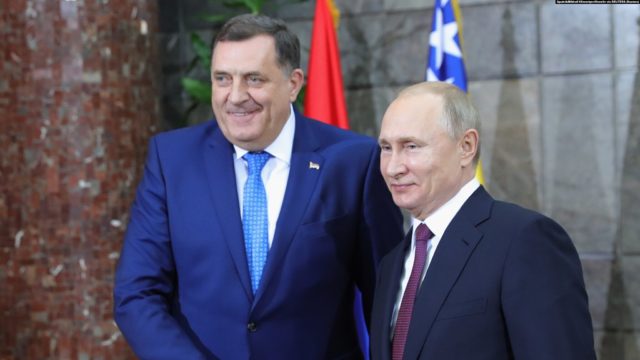
Widening Cracks in Bosnia-Herzegovina and Dodik’s Russian Mission
Publication: Eurasia Daily Monitor Volume: 18 Issue: 189
By:

Emboldened by Moscow and Belgrade, Milorad Dodik, the Bosnian Serbs leader in Bosnia-Herzegovina, followed on his October announcement that Republika Srpska (Serb Republic) would start withdrawing from shared state institutions, including the army, judiciary, tax system and security services (RTV, December 10). On December 10, the Serb entity’s national assembly voted to begin the process, which, if permitted to proceed, could result not only in the breakup of Bosnia-Herzegovina as a state but also trigger a new Balkan war. The previous week, Dodik visited Moscow and met with Russian President Vladimir Putin to secure the Kremlin’s political support for Republika Srpska’s eventual secession (Kommersant, December 2; TASS, December 3). The Russian ambassador to Bosnia-Herzegovina, Igor Kalabukhov, said last month that he saw no problem with Milorad Dodik’s idea of an independent Republika Srpska within Bosnia-Herzegovina (B92, November 11).
The events are unfolding just as Russia is staging a massive military buildup on its border with Ukraine in an apparent threat to attack the country again. A new conflict in the Balkans would serve as a much-needed distraction from the Kremlin’s plot for another offensive on Ukraine, as it would open a second front to channel the United States’ and European attention and efforts to prevent escalation.
Dodik has promoted secession of the Serb entity from Bosnia-Herzegovina for years. Still, he became particularly assertive after officials in the neighboring country of Serbia began promoting the “Serbian World” idea—the formal political and institutional unification of the Serbian populations living in different states in the Balkans (Balkan Insight, September 2). The concept is a copycat of Russian President Vladimir Putin’s “Russian World” (“Russkiy Mir”) doctrine that served to justify the annexation of Ukrainian territories in 2014.
Russia has exploited ethnic divisions in Bosnia-Herzegovina and courted Republika Srpska’s leadership, enticing it with energy deals and assistance to the local security forces. Since the Serb entity cannot maintain its own army under the Dayton Accords of 1995, cooperation with Russia is mainly focused on training and arming the police, which often resembles building the entity’s paramilitary force (Balkan Insight, February 20, 2018). Banja Luka has benefited from low prices of Russian natural gas, and Dodik managed to convince Putin to maintain the current gas price for Republika Srpska, which is $290 per thousand cubic meters, while the European spot market prices topped $1,000 this fall. The Bosnian Serbs leader also announced that the Russian president supports building an extension of the TurkStream Two gas pipeline from Serbia to Republika Srpska (TASS, December 3).
Moscow has aligned with Republika Srpska in objecting to the mission of the United Nations High Representative for Bosnia-Herzegovina and opposing the extension to the 700-strong European Union Force (EUFOR). Although the UN Security Council (UNSC) prolonged EUFOR’s deployment in November, it did so at the price of concealing, under Russian pressure, a critical report by the newly-appointed UN High Commissioner Christian Schmidt. The former German diplomat warned that if Republika Srpska carries out creating its own army, thus splitting the military of Bosnia-Herzegovina into two, additional international peacekeepers would be needed in the Balkans to stop the slide toward a new war (The Guardian, November 2). Schmidt was blocked from reporting to the UNSC that Bosnia-Herzegovina is facing the biggest “existential threat of the post-war period” (PBS, November 2).
Like the Bosnian Serbs leader, Russia does not recognize the new high representative, who took office on August 1, but was not approved by the UN Security Council, as Russia insisted (TASS, December 2). Moscow views the post of the high representative as “a brake on the country’s development.” Still, Russia’s primary demand is the strict observance of the Dayton Accords, especially regarding the equality and independence of Republika Srpska. Furthermore, Moscow meets with hostility any attempts at revising Dayton to increase the functionality of Bosnia-Herzegovina as a state (Kommersant, December 2).
Dodik, for his part, complains that the laws of his country are decided by foreigners, being especially sensitive to the law banning the denial of genocide during the Balkan wars, pushed by the previous UN high representative, Valentin Inzko (Euronews, July 28). Meeting with the European Commissioner for Enlargement Oliver Varhelji on December 16, Dodik expressed expectation that the law would be annulled and reiterated that the Serb entity does not recognize the UN high representative (RTRS, December 16). He also pointed out the parliament’s decisions opening the way to secession.
In this regard, Banja Luka may be particularly useful for Moscow since the integration of Bosnia-Herzegovina into the North Atlantic Treaty Organization (NATO) and the EU is impossible without the consent of Republika Srpska’s leadership. A renewed conflict in the Balkans will undoubtedly stop any integration prospects for decades to come. Washington and European capitals have reacted to Banja Luka’s decisions to separate from Bosnia-Herzegovina. US Secretary of State Anthony Blinken warned of sanctions against Republika Srpska, some of them already in place. The new German Foreign Minister Annalena Baerbock called for the EU to slap sanctions on Milorad Dodik for trying to break away the Serb-majority areas in Bosnia-Herzegovina (Deutsche Welle, December 13). Turkey has also expressed strong support for Bosnia-Herzegovina’s sovereignty and territorial integrity (Daily Sabah, December 12).
Despite the parliamentary vote on December 10, however, the process of “taking back power” from Sarajevo would be illegal if it does not involve changes in the Constitution of Bosnia-Herzegovina—which are unlikely to be accepted by the Bosnian Muslims and Croats. In addition, a potential referendum in the Serb entity may not produce the outcome desired by the Serb leadership. Although Dodik does not care about being put under more Western sanctions, business owners in Republika Srpska are worried about broader sanctions that can cripple their livelihood and the region. And though many Serbs may fall for the nationalist rhetoric, most of them are wary of another bloody and senseless war looming on the horizon.



